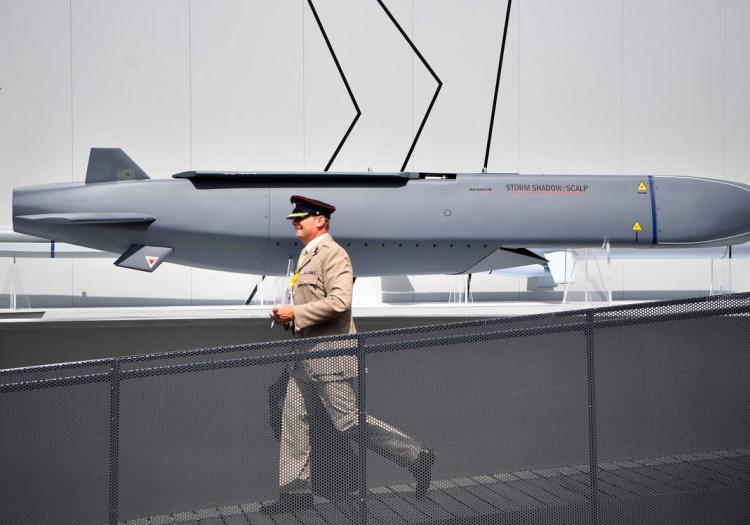
Kiev/Moscow (Reuters) - Ukraine fired British-made Stormshadow cruise missiles into Russia on Wednesday, the latest Western weapon approved to attack Russian territory after the U.S. Army tactical missile system. Meanwhile, Russia struck Ukraine with an intercontinental ballistic missile for the first time, raising fears that fighting could escalate further.
The Financial Times, citing unnamed Western officials, reported that Ukrainian forces fired several British-supplied Storm Shadow cruise missiles at at least one Russian military target on Wednesday (November 20). At the G20 summit last week, Western officials reportedly had informal discussions about Ukraine's use of Scalp missiles, which have been developed jointly by the UK and France, because it would send a clear message to North Korean soldiers on the Russian front.
The Guardian also reported that Britain had given Ukraine permission to fire Stormshadow missiles into Russia in response to Moscow's deployment of North Korean troops to its border.
Russia confirms Storm Shadow missile attack. Russia's Defense Ministry said Thursday that it shot down two British-made Storm Shadow cruise missiles in the past 24 hours.
Ukraine's air force said Russia used an intercontinental ballistic missile in Thursday's attack on businesses and critical infrastructure in the central Ukrainian city of Dnipro. Experts say this is the first time an intercontinental ballistic missile has been used in combat. The missile has a range of thousands of kilometers and can carry nuclear warheads.
Russia also fired a Kinzhal hypersonic missile and seven Kh-101 cruise missiles, six of which were shot down, the Ukrainian army said. Ukrainian President Volodymyr Zelensky later said experts were determining the type of intercontinental ballistic missile launched by the Russian military and accused Putin of using Ukraine as a testing ground.
"Ukraine Pravda" quoted the news reported that the Russian army is using the RS-26 Rubezh missile with a range of 5,800 kilometers. According to Ukrainian military sources told AFP that the missile apparently did not carry a nuclear weapon, indicating that Russian President Vladimir Putin launched the missile for political purposes. Moscow declined to comment on the matter.
Eu foreign affairs spokesman Giorgio Stano said that if the use of ICBMs was confirmed, it would mark another clear escalation by Putin and would bring a "quantitative and qualitative change" to the war. A spokesman for British Prime Minister Starmer also said that if true, this would be "another example of depraved, reckless and escalating Russian behavior."
U.S. Defense Secretary John Austin confirmed Wednesday that the United States will provide Ukraine with anti-infantry mines to help slow the Russian advance. The Biden administration is also preparing to forgive about $4.7 billion in U.S. loans to Ukraine.
Russia ruled out territorial concessions and insisted Kiev renounce NATO membership
Russia and Ukraine are trying to gain an edge on the battlefield before former US President Donald Trump returns to the White House. The Kremlin is open to negotiating a ceasefire with Ukraine with Trump, but rules out major territorial concessions and insists Kiev renounce NATO membership, according to former and current Russian officials quoted by Reuters.
Russian Foreign Ministry spokeswoman Maria Zakharova said Thursday that Russia is ready to open talks on any realistic peace initiative. "The key is to take into account Russia's national interests, the current situation and to guarantee compliance with the relevant agreements," she stressed.
Kremlin spokesman Dmitry Peskov said on the same day that Russia is doing its utmost to prevent the outbreak of nuclear conflict and hopes that other countries will take the same responsible position. Vladimir Putin has approved a new version of the state's basic policy of nuclear deterrence, allowing Russia to use nuclear weapons in the event of a conventional or nuclear attack that threatens the country's survival.
Matthew Bunn, a professor at Harvard University, said Russia is trying to use nuclear weapons to intimidate Western countries into abandoning their support for Ukraine. "The probability of Russia using nuclear weapons in the short term has not increased, and the long-term risk of nuclear war may have increased slightly," he said.

The global electric vehicle market in 2025 is experiencing intense turbulence. Tesla, once a disruptor that reshaped the industry landscape, is now mired in an unprecedented sales crisis.
The global electric vehicle market in 2025 is experiencing …
Recently, Chinese telecom companies Huawei and ZTE signed a…
Recently, according to Xinhua News Agency, Israel's air str…
A strongly worded report from the Equality Trust argues tha…
On November 27, 2025, Alibaba officially entered the global…
The focus of the global financial market in 2025 has always…